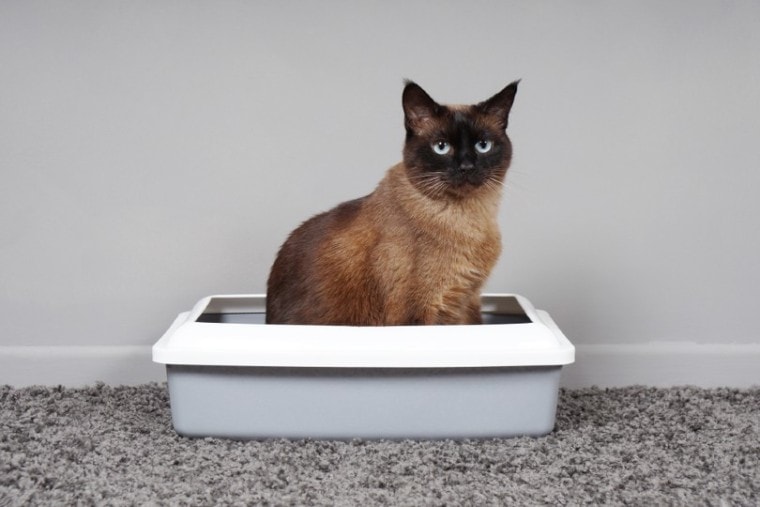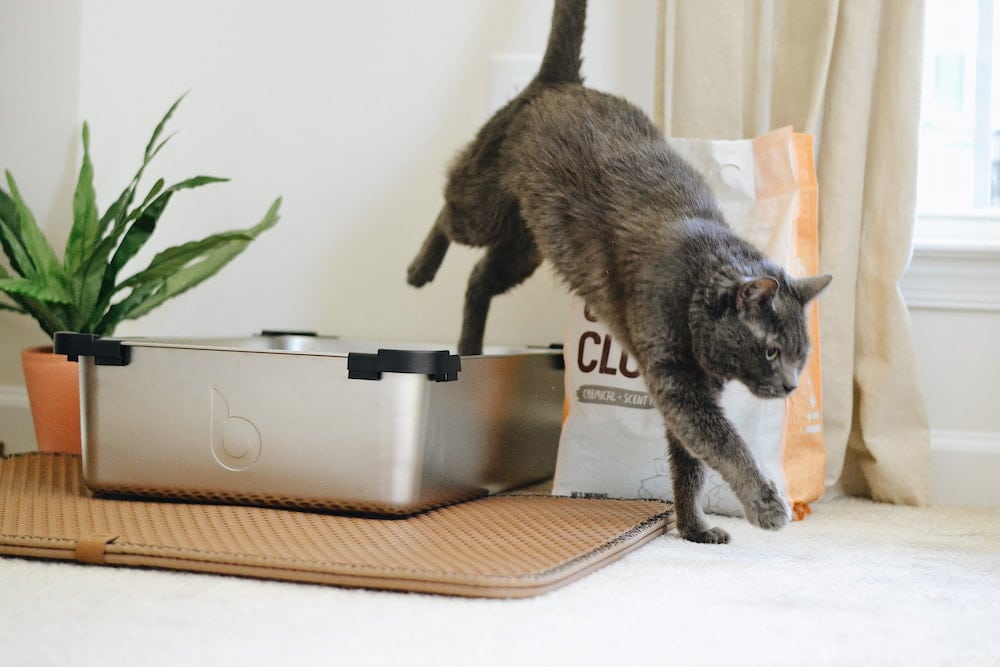
Dogs typically go outside to use the bathroom, but cats often need to use a litter box. When did this difference occur, and why do these two popular pets use the bathroom so differently?
Unlike dogs, using the bathroom on a loose surface is a natural instinct for cats. In the wild, cats would find loose soil or sand and bury their waste there. Since this is a natural behavior, it’s often easy to train a cat to perform this task indoors.
Plus, cats are small enough for us to accommodate their needs inside. A cat-sized litterbox doesn’t take up that much room. However, could you imagine the size that a litterbox would need to be for a large dog?
Some cats are trained to go outside to use their litterbox. However, it is not generally recommended to let your cat go outside at all. Since cats are often not trained to walk on leashes and can jump fences, there is no easy way to contain them outside (like you can with a dog). For this reason, an inside solution to their litter box need is often required.
Why Do Cats Need a Litterbox?
It isn’t that cats need a litterbox. However, it is simply the easiest option in most cases.
In the wild, cats need to cover up their waste for various reasons. For one thing, it helps keep their territory clean, as cats naturally stick to the same general area. If the cat continuously used the bathroom in the same location, it would get dirty and smelly.
This issue would lead to two more problems. Predators would be attracted to the cat’s feces and urine since the predator would know that the cat was nearby. Obviously, if you’re the cat, this is the last thing that you’d want to happen.
Similarly, it would also scare prey away. If prey knows that there is a cat nearby because they can smell their feces, they’ll likely flee and find somewhere safer.
When a cat buries their feces, these problems are averted.
For this reason, domestic cats will often attempt to do this. All cats are attracted to areas where burying their waste will be easier. Therefore, litterboxes are a natural product to come from this behavior. Of course, in our homes, cats don’t need to hide their presence from prey or predators. However, their instincts don’t know this and will continue encouraging the feline to bury their waste.

Do Cats Automatically Know How to Use a Litter Box?
For the most part, yes, all cats will naturally know how to use a litterbox. Even kittens will perform the same routine that adult cats do. You don’t typically have to teach a cat to use a litterbox. It’s in their genetics.
However, you may need to teach your cat to only use the litter box, though this often comes naturally too. Cats will automatically try to go to the bathroom in the same spot. If this happens to be the litterbox, that’s where they will likely continue to go.
Furthermore, cats want to bury their waste with as little effort as possible, so they’ll look for areas with loose soil. Cat litter is far easier to dig than hard floors. Therefore, many cats will automatically gravitate toward litterboxes.
Many felines don’t need to be trained much at all. Often, as long as you provide a litterbox to a kitten, they should figure out how to use it. It’s all about their instincts, not necessarily their training.

Do All Cats Use a Litterbox?
All cats will have the same instinct to use an area like a litterbox for their business. However, that doesn’t mean that all cats will automatically use the litterbox. Some may need to be trained like a dog, with treats and praise.
Sometimes, the litterbox itself may discourage a cat from using it. For instance, if the sides are too high, kittens may have a hard time accessing the litter. If the box is too small, older cats may not use it correctly or at all.
The key is to make the litter box as straightforward to use as possible. Otherwise, your feline may decide to just go to the bathroom elsewhere. The last thing that you want is for this to become a habit, as it will then become quite difficult to convince your feline to use the litterbox again.
Therefore, you should do everything that you can to encourage your cat to use the litterbox. Often, this means putting it somewhere quiet, where they can use it in peace. Some cats may avoid litterboxes in busier parts of the home. You should also keep it clean and properly cared for. Just like us, cats don’t want to use a dirty bathroom.
If you have multiple cats, be sure to invest in multiple litterboxes. Otherwise, your cats may dirty up the litter too quickly, which may cause them to go to the bathroom elsewhere. Furthermore, many felines don’t like to use the litterbox after another cat has gone.
Conclusion
All cats are born with an innate instinct to cover up their waste. This developed from their days in the wild when they would need to hide their existence from prey and predators. Since it was a matter of survival, this instinct is currently present in every domestic cat. Those who didn’t do it got eaten or starved, which prevented them from reproducing.
Therefore, cats often don’t need much training to use a litterbox. You simply need to make it available, and most cats will use it without much of a problem. Of course, you should ensure that the litterbox is set up appropriately for them to use it.
In the modern world, giving a cat a litterbox is often the easiest way to fulfill their bathroom needs. Cats can’t easily be contained outside, and they are small enough to make litterboxes manageable in the home.
Featured Image Credit: Axel Bueckert, Shutterstock






